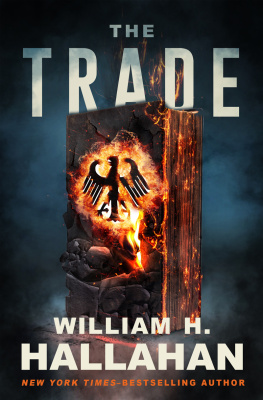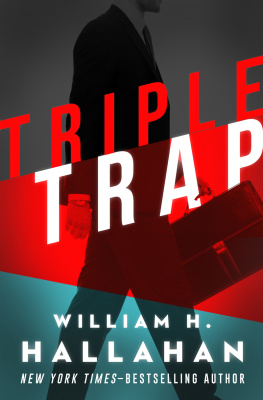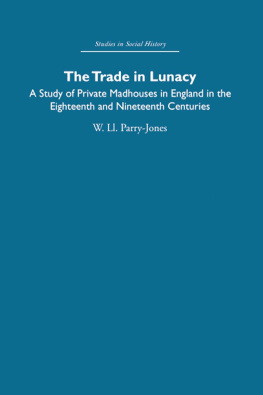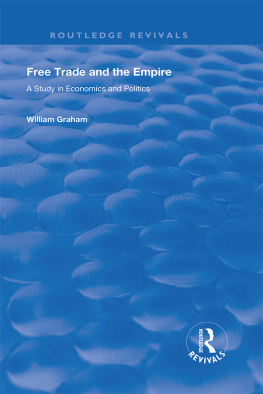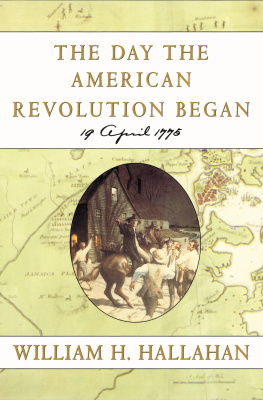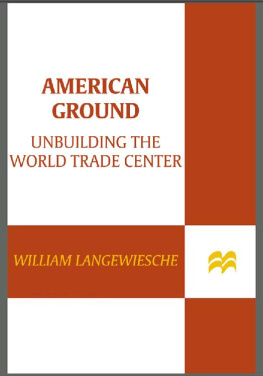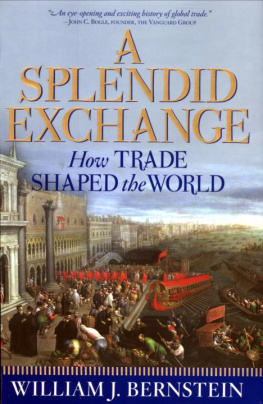William H Hallahan - The Trade
Here you can read online William H Hallahan - The Trade full text of the book (entire story) in english for free. Download pdf and epub, get meaning, cover and reviews about this ebook. year: 2019, publisher: MysteriousPress.com/Open Road, genre: Detective and thriller. Description of the work, (preface) as well as reviews are available. Best literature library LitArk.com created for fans of good reading and offers a wide selection of genres:
Romance novel
Science fiction
Adventure
Detective
Science
History
Home and family
Prose
Art
Politics
Computer
Non-fiction
Religion
Business
Children
Humor
Choose a favorite category and find really read worthwhile books. Enjoy immersion in the world of imagination, feel the emotions of the characters or learn something new for yourself, make an fascinating discovery.
- Book:The Trade
- Author:
- Publisher:MysteriousPress.com/Open Road
- Genre:
- Year:2019
- Rating:4 / 5
- Favourites:Add to favourites
- Your mark:
- 80
- 1
- 2
- 3
- 4
- 5
The Trade: summary, description and annotation
We offer to read an annotation, description, summary or preface (depends on what the author of the book "The Trade" wrote himself). If you haven't found the necessary information about the book — write in the comments, we will try to find it.
William H Hallahan: author's other books
Who wrote The Trade? Find out the surname, the name of the author of the book and a list of all author's works by series.
The Trade — read online for free the complete book (whole text) full work
Below is the text of the book, divided by pages. System saving the place of the last page read, allows you to conveniently read the book "The Trade" online for free, without having to search again every time where you left off. Put a bookmark, and you can go to the page where you finished reading at any time.
Font size:
Interval:
Bookmark:




William H. Hallahan

For Janet
In April 1945, American and British forces, sweeping across the Rhineland of Germany, reached the Elbe River and waited there while Russian troops, driving from the east, overran and sacked Berlin.
The place of the Allied halt was profoundly significant, for the Elbe River became a principal part of the boundary line between East and West Germany. It was the line of permanent dismemberment of the Third Reich. Today few people believe that the reunification of the German nation will occur in the lifetimes of those now alive. For already the barrier has existed for nearly forty years.
But there are those who dream of removing it forcibly.
The heat in the streets was malevolent.
All the military advisers had told Colin Thomas that here in Central America, neither the government troops nor the revolutionists ever commenced shooting before four in the afternoon.
It was only noon, far too early, yet Thomas had ordered all the troops in place, where they crouched in misery, for the sun was directly overhead, and it was difficult to find any cover. The very sidewalks and the street pavings, the walls and the stones of the buildings that the troops hugged were radiating heat like ovens, and the sun was making them hotter every minute.
Thomas stood on the rooftop and felt the sweat run down his face and down his back. A heat breeze, panting, stirred the scaly, scraping leaves of the palms while high in the sky, the vultures circled expectantly. Not a civilian was in sight; no traffic moved: the noncombatants had cleared out. The town pigeons hid in the coolness of the belfries. It was 105 degrees in the shade.
The leader of the government troops, Colonel Mendezpart Spanish, part Indian, part blacklooked at the thermometer and then, with doubt, at Thomas.
Are all the units in position? Thomas asked.
Yes.
Then its your show, Colonel Mendez.
The two of them, from the rooftop of the office building, studied the terrain with their field glasses.
The objective was a collection of half-finished high-rise apartments being built for Galpagos swarming poor. During the night, the rebel Sindicalistas had slipped into the city and occupied the buildings, where they now waited in the cool shade.
The colonel didnt move. The sun has made our rifles too hot. My men cannot hold them. And they have no water.
That will give them the incentive they need to fight their way into the buildings. Theres plenty of water and shade inside.
We will wait until four. Colonel Mendez folded his plump arms and looked exactly like a bountiful Buddha.
Go, Thomas said. Now.
Colonel Mendezs flat brown eyes looked into Colin Thomass pale-blue gringo eyes and attentively read their message. He glanced down once at the pistol in Thomass hip holster, then turned and made a signal with raised hands showing huge sweat stains at both armpits of his tunic. The signal was received. The attack would begin.
It was ironic that the rebel Sindicalistas had occupied the apartment complex. The Benevolent Leader himself had a great financial interest in those buildings, and he was having an unpleasant task in explaining the huge cracks that had appeared in the walls.
It was murmured in the cafs that the cement had far too much sand, and many doubted that the buildings would stand long enough to be finished. The government leaders had stolen too much cement money for their secret bank accounts; they were behaving like grasping men who expected soon to be out of officeexiled or executed. They waited with their families in the Jockey Club near the airport with their private aircraft for the outcome of the battle.
At fifteen minutes past noon the government troops started the battle with a mortar shell that blew a hole in the side of an apartment three stories up. The boom roared inside the hollow building like a drum, and a great cloud of cement dust roiled across the compound. Government snipers on the burning rooftops and government troops in the side alleys began to pour a thundering hail of fire into the buildings. Other units hurried into the streets and ran toward the complex, shouting wildly. The governments two tanks crawled forward, so sun-hot the tank commanders risked their own safety rather than shut their ports and vents. Behind the tanks crouched parts of several platoons.
All the weeks of Thomass training program in the jungle north of Galpagos City were now put to the test.
Sixth Platoon quickly cut off Avenue May First at the rear to prevent rebel reinforcements from entering, and, once in position, the Sixth commenced firing a heavy, pounding barrage at the complex. More mortar shells blew holes in the walls, and the hollow buildings reechoed with booms that carried for miles. The concussions made the ground tremble, and cement dust rose in a cloud over the complex.
Seventh and Eighth Platoons reached the walls of the apartment buildings before the first rebel shots were fired. When the rebels began firing back, Thomas detected the sound of Russian Kalashnikov automatic rifles and some old American M-Is. The rebels were also firing rifle grenades down at the doorways and along walls to create blizzards of stone fragments amid the charging troops.
The fire fight increased in ferocity and now the afternoon was filled with screams and cries, shouted orders and earth-shaking noise.
Government snipers on the rooftops kept up a raking fire at the windows of the buildings while the other platoons at street level maintained a covering fire. More government units hurried out of the side streets toward the complex.
The attacking platoons were now mounting the scaffolding outside the buildings in order to clean out the rebels from the top floors down. Many, hit by rifle fire, fell screaming into the streets. Smoke began to flow from a number of fires inside the buildings.
Thomas felt he had only four or five hours to clean out the rebel Sindicalistas, for with darkness the rebels could regroup to plan new strategies. He would then have to bring up enough artillery to pound the buildings to rubble and that could take days or weeks.
The ferocity of the government troops surprised even Thomas, for within two hours it was clear that the rebels were in a bad position and that the midday surprise attack had caught them unprepared. They had occupied the buildings as a staging areaa place to wait out the days heat. Their laxness had let the government troops get control of the upper floors and of the streets around the buildings. And now outnumbered, outgunned, with no reserves of ammunition, the rebels were cut off from both supplies and reinforcements.
By four oclock it was all over. The government soldiers draped flags from many windows. Their comrades in the streets waved flags back, cheering.
The water tankers drove into the complex, followed by ambulances and trucks, while the troops were openly shooting prisoners through the head with their pistols. There would be few captives.
Font size:
Interval:
Bookmark:
Similar books «The Trade»
Look at similar books to The Trade. We have selected literature similar in name and meaning in the hope of providing readers with more options to find new, interesting, not yet read works.
Discussion, reviews of the book The Trade and just readers' own opinions. Leave your comments, write what you think about the work, its meaning or the main characters. Specify what exactly you liked and what you didn't like, and why you think so.

